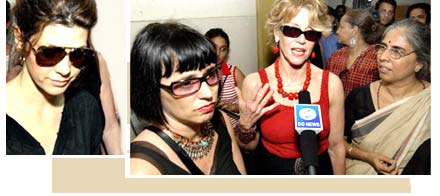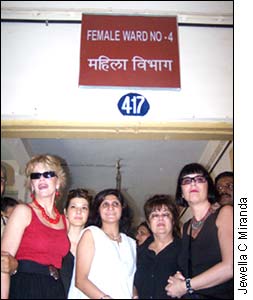

In a crumpled black salwar kurta and sneakers, Marisa Tomei (above, left) did not look like someone who had won an Oscar.
No makeup. Hair tied carelessly. No accessories, barring a pair of dark sunglasses casually propped over her head.
She walked into the female ward number 4 at the municipal hospital in Dharavi, once considered Asia's largest slum, and sat down beside Sushma (name changed), an elderly lady with an infected leg.
"I want soap. Do you have soap?" Sushma asked Marisa in Hindi. The actor reached into her Duane Reade plastic bag, took out a pack of Crayola crayons and placed it in Sushma's hand.
It wasn't what she wanted, but Sushma kept the pack under her pillow to give it to her grandchildren when they visited her next.
Marisa listened to her speak, asked her how she was and patted her back.
If compassion can speak a universal language, it was, at that moment, speaking with an American twang. It was speaking in Marathi laced with Hindi.
The last time Marisa Tomei had visited a place like this was in the Balkans. In the refugee camps of Bosnia, the former Yugoslavian province.
The experiences of the refugees were documented by her friend and playwright Eve Ensler (above, second from left) in Necessary Targets -- a play about women and war -- and Marisa, with Glenn Close, had travelled to Sarajevo to act in the play with Bosnian actors in 1998.
The play ran Off-Broadway in New York in 2002 and had a special reading in Mumbai last week.
Seven years ago, Marisa had tried repatriating Bosnian orphans as a relief worker in Welcome To Sarajevo, a film that focussed on the plight of children in the war-ravaged city.
"I feel love," she said about her visit to the ward for abused and ailing women in Mumbai. "I feel lots of love. Aren't there any children here?"
The Duane Reade (a wellknown chain of pharmacies in New York) bag had stuff for kids, but she did not find many of them at the hospital.
A key figure for V-Day -- a global movement to stop violence against women started by Eve Ensler -- Marisa, Jane Fonda (below, left) and Eve were the first international guests to visit the centre known as SNEHA (Society for Nutrition Education Health Action), which is located at the hospital.
 Founded on November 27, 2000 by Dr Almeida Fernandes (seen in the title image, wearing a sari), who worked as a doctor in a well-known city hospital for 30 years, SNEHA is a shelter for women in crisis.
Founded on November 27, 2000 by Dr Almeida Fernandes (seen in the title image, wearing a sari), who worked as a doctor in a well-known city hospital for 30 years, SNEHA is a shelter for women in crisis.
The women's stories in that room were poignant and cruel. A 16-year-old orphan brought to work for an uncle who beat her every day; a woman whose daughter was burned to death and receiving threats that four of her remaining girls would meet the same fate; a woman dying of AIDS
In a bright red blouse and skirt, looking every bit the movie and fitness icon that she is, Jane Fonda was listening to Rehana Khan (name changed).
Her husband had beaten her yet again. So badly, this time, that the 25-year-old was using crutches to hobble around.
Jane asked her many questions, particularly about whether she knew how to protect herself from an abusive husband. What if he came to the shelter here? What is the mechanism for change? Who was looking after her one-year-old child?
Dr Nayreen Daruwalla (third from right in image above), project coordinator for the centre, explained the importance of the family therapy approach because the women returned to their homes after spending time at the shelter.
Most women came from poor economic backgrounds, Dr Daruwalla said, and many men reined in their violence after realising their wives had the backing of an organisation that could intervene and was watching.
SNEHA, which is assisted by the local police, provides these women with legal advice and encourages them to learn income-generating crafts.
On the bed on the other side was Amna (name changed). She was worried about her son's pneumonia. He has AIDS. Her husband had given it to her, and she had unwittingly passed it on to the little boy.
Amna's husband has refused to give her any money for treatment. He had to be cured first, he told her, the money was for him first.
"Economic sustenance is the main reason these women go back to abusive husbands," reveals Dr Daruwalla. "They even tell us it is the husband's right to beat wives."
SNEHA was helping Amna and her child.
Jane, Marisa and Eve had contributed by performing The Vagina Monologues in Mumbai, part of whose proceeds would be gifted to the centre.
Eve spent her entire time at the ward with the teenager who was tortured by her uncle. "You write to me," she told her. "Write in Hindi and they will translate it, but write to me."
The little boy with AIDS sat in his mother's lap, looking at Jane.
"He's four," said Amna.
"My grandson is that age," replied Jane, tears welling in her eyes as she reached out to hold Amna's hand and kissed it.
Amna was the healthiest in her AIDS-stricken family of three but could not hold back her tears. Marisa sat quietly behind her all the while. She too wept silently.
SNEHA can be contacted at the Urban Health Centre, 60 Feet Road, Dharavi, Mumbai -- 400 017. Their helpline number is 91-22-24042627.
ALSO SEEVagina is not a dirty word
'There is something very powerful about India': Jane Fona
'I'm very opposed to our war in Iraq': Jane Fonda
Female bonding
Title photographs: Rob Elliott/AFP/Getty Images






 © 2025
© 2025